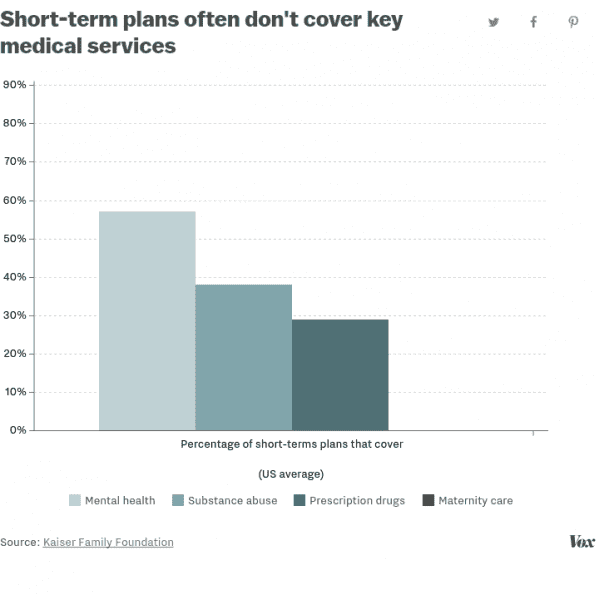
We should soon see exactly what the Trump administration has in mind for short-term limited-duration insurance, plans that are offered for a limited period of time and are not subject to Obamacare’s health insurance rules, like the law’s prohibition on preexisting conditions.
Monday was the deadline for public comments, which means an actual regulation should be forthcoming. We know the administration wants to allow these plans to be sold for a full year (they are currently limited to three months), but we have other unanswered questions. Such as: Will the administration allow these plans to be renewed or not?
In the meantime, whenever we talk about President Trump’s plan to expand non-Obamacare insurance, we focus on two points:
Let’s dig in on that second point, with some new data from the Kaiser Family Foundation.
The researchers at KFF looked at the short-term plans already on the market, what kinds of services they cover, and how robust their benefits actually are. The big takeaway: Yes, these plans are generally cheaper (their biggest selling point in the administration’s eyes), but that comes with a serious trade-off.
”Short-term health insurance policies offer lower monthly premiums compared to ACA-compliant plans because short-term policies offer less insurance protection,” the researchers wrote.
It’s really that simple.
But to be more specific: Short-term plans are much less likely to cover mental health and substance abuse treatment or prescription drugs — all of which must be covered by ACA plans. What is insurance, you might ask, if it doesn’t cover medications? This is also a setback for the ongoing effort to have mental health and substance abuse treated as equal to other physical health needs.
And none of the plans that KFF examined cover maternity care, which is also a requirement for Obamacare coverage.

There are substantial variations across states, but the picture is clear: If you buy a short-term plan thinking it’ll cover a prescription when you get a bad sinus infection or if you decide you need to see a therapist, you should double-check. Obamacare was designed to eliminate those kinds of surprises, but they could be coming back in the name of cheaper premiums.
And even if a short-term plan does cover services you need, the financial protection is not nearly as robust as what Obamacare guarantees. The KFF researchers found plans in Miami, Phoenix, and Houston that could require patients to pay much more — up to $20,000 or even $30,000 in just three months — out of pocket for their health care. The ACA caps out-of-pocket spending at $7,000 for an individual or $14,000 for a family over an entire year, and many low-income customers receive additional discounts.
So while one of the biggest complaints about Obamacare coverage has been the still-high out-of-pocket costs, these short-term plans are even less generous in many cases. They also have overall benefit limits as low as $250,000 — which sounds high but is very much within reach in the case of a serious medical emergency. ACA plans are also barred from that kind of cap on benefits.
Some people, particularly the young and healthy, might be willing to take that risk. That is certainly the market the administration is catering to. But part of Obamacare’s purpose was to eliminate a world in which you couldn’t really be sure what you were getting when you were buying “insurance.”
Under Trump, though, the definition is only getting less clear.
This story appears in VoxCare, a newsletter from Vox on the latest twists and turns in America’s health care debate. Sign up to get VoxCare in your inbox along with more health care stats and news.
vox-mark
VoxCare
Subscribe
By signing up, you agree to our Privacy Policy and European users agree to the data transfer policy.
For more newsletters, check out our newsletters page.
Sourse: vox.com






